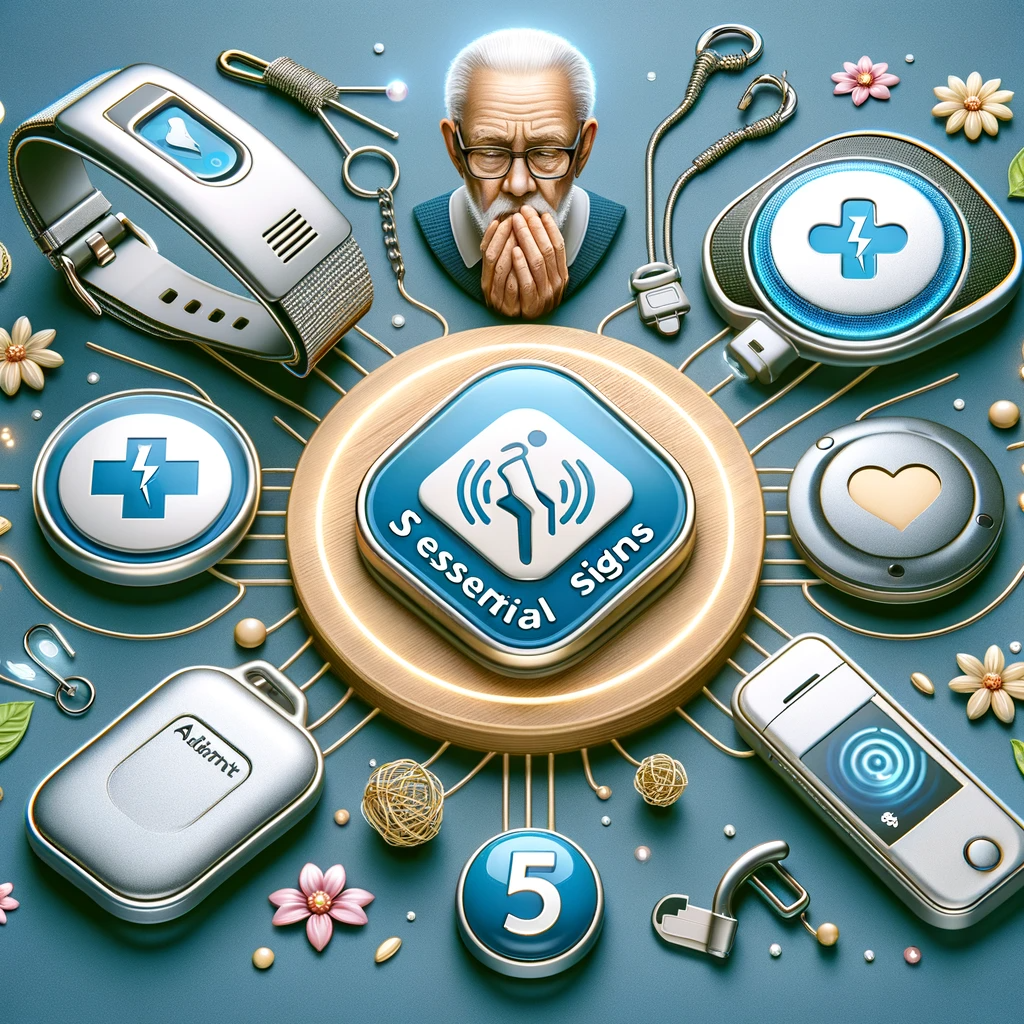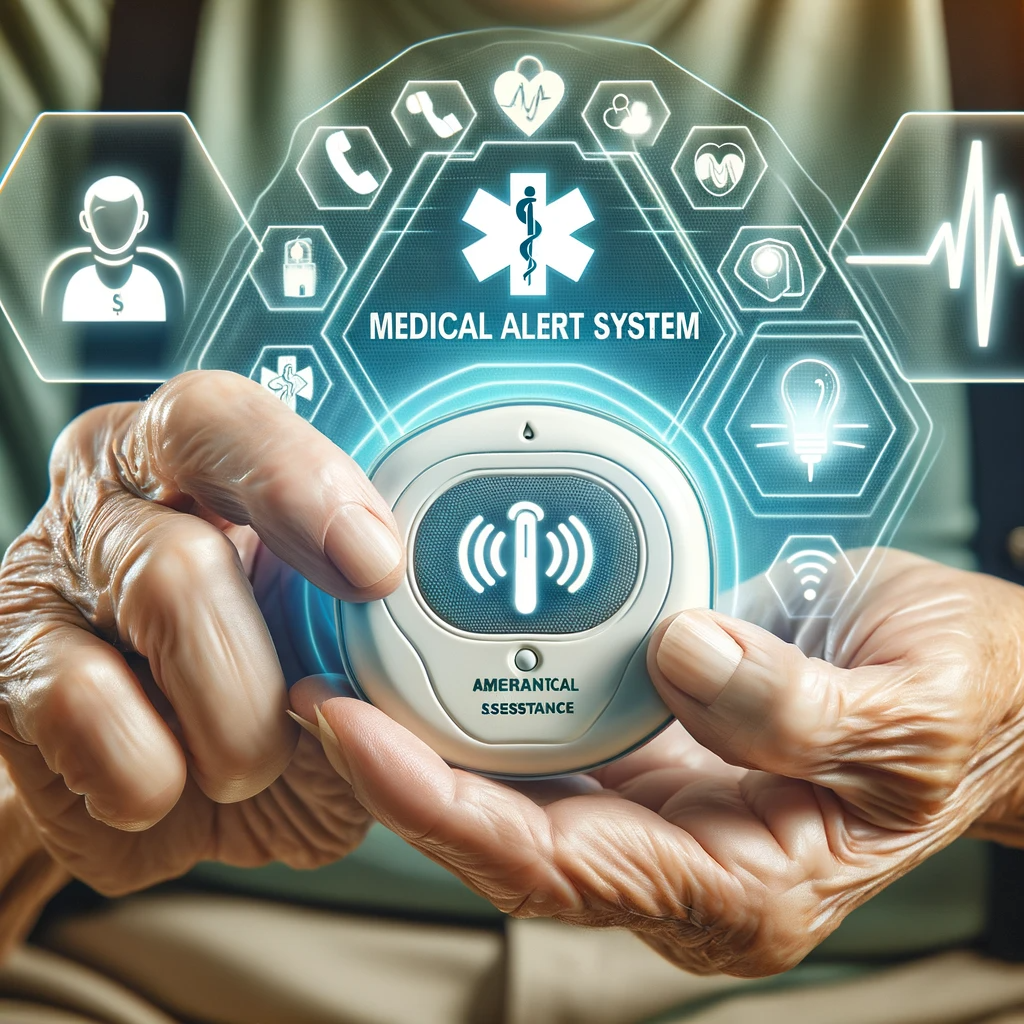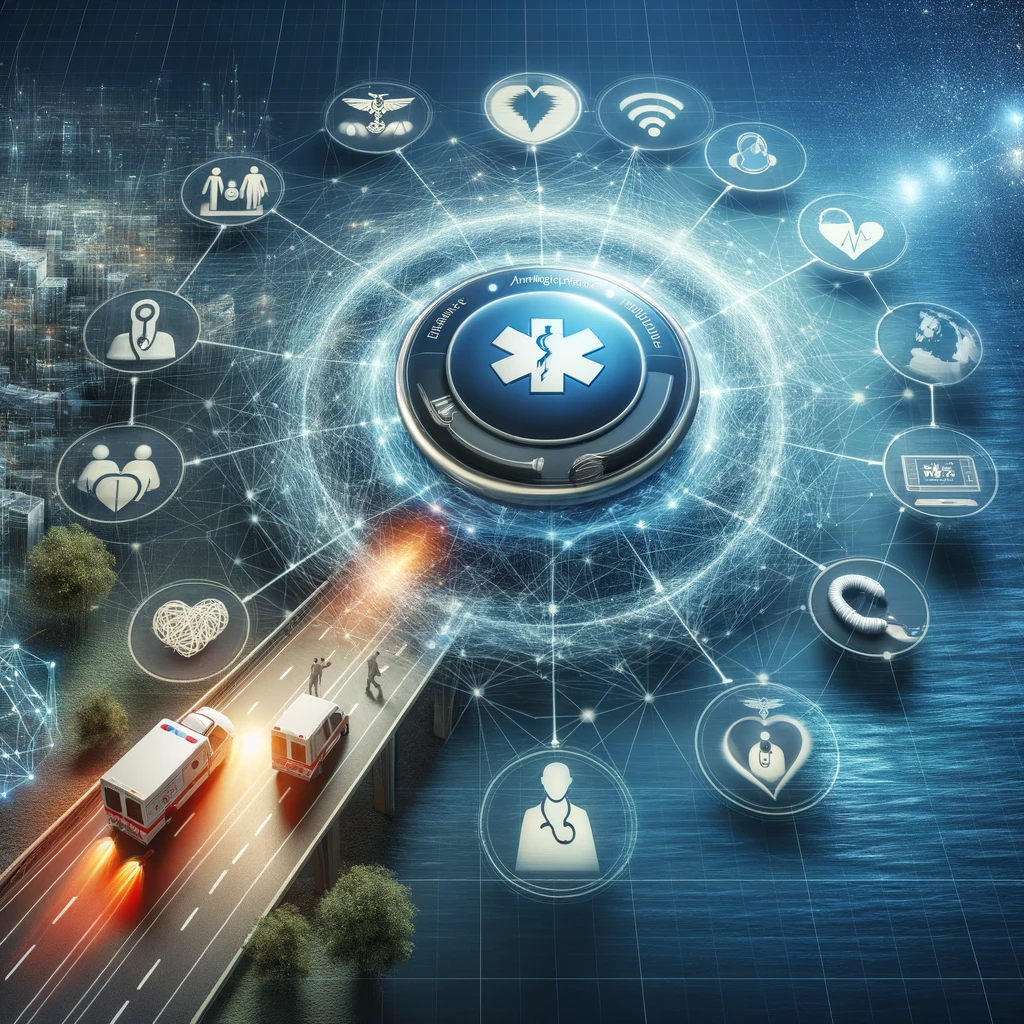Guide to Selecting a Medical Alert Device
In an emergency situation, your life or that of your aging family member could depend on the medical alert product you choose.

Introduction
Medical alert systems are designed to provide immediate assistance in emergency situations, giving seniors and their loved ones peace of mind. These systems typically consist of a wearable device, such as a pendant or wristband, and a base unit that connects to a 24/7 monitoring center. With the press of a button, users can quickly summon help in the event of a fall, medical emergency, or other crisis. (Keep keywords: medical alert systems, medical alert, medical emergency, monitoring center, alert systems)
Benefits of Medical Alert Devices
Medical alert devices offer numerous benefits, including:
- Increased independence: With a medical alert system, seniors can live alone with confidence, knowing that help is just a button press away.
- Peace of mind: Medical alert systems provide peace of mind for both the user and their loved ones, knowing that help is always available in an emergency.
- Fast response times: Medical alert systems can quickly summon help in the event of a medical emergency, reducing the risk of serious injury or death.
- Customizable: Many medical alert systems offer customizable features, such as fall detection and GPS tracking, to meet the unique needs of each user. (Keep keywords: medical alert systems, medical alert system, medical alert devices, medical alert, fall detection, medical emergency, alert systems)
Medical Alert System Installation and Setup
Proper installation and setup of a medical alert system is crucial to ensure optimal performance. Here are some tips to ensure a smooth installation process: (Keep keywords: medical alert system, medical alert)
Ensuring Proper Installation for Optimal Performance
- Choose a reputable provider: Select a medical alert system provider that offers reliable and efficient installation services.
- Follow manufacturer instructions: Carefully follow the manufacturer’s instructions for installation and setup to ensure that the system is properly configured.
- Test the system: Test the medical alert system to ensure that it is working properly and that the user understands how to use it.
- Provide emergency contact information: Provide the monitoring center with emergency contact information, such as phone numbers and addresses, to ensure that help can be dispatched quickly in an emergency.
- Regularly check and maintain the system: Regularly check and maintain the medical alert system to ensure that it is working properly and that the user is comfortable using it.
By following these tips, users can ensure that their medical alert system is properly installed and set up, providing them with peace of mind and confidence in their ability to summon help in an emergency. (Keep keywords: medical alert system, medical alert, monitoring center)
Medical alert systems have emerged as indispensable tools for individuals who may face medical emergencies, especially when living alone. These systems, also known as personal emergency response systems (PERS), serve as a lifeline to emergency services, providing immediate assistance when needed through a medical alert button. They are particularly beneficial for the elderly, people with medical conditions, or those recovering from surgery, ensuring that help is just a button press away.
The Role of Medical Alert Systems in Emergency Response
A medical alert system typically consists of a wearable device, like a pendant or bracelet, equipped with a button to summon help. Upon activation, the device connects the user to a monitoring center, staffed by trained professionals ready to dispatch emergency services or contact designated family members. This immediate response can be crucial in preventing severe complications from falls, heart attacks, strokes, or other medical emergencies by ensuring that emergency contacts are notified promptly.
Variety and Customization for Individual Needs
The medical alert industry has evolved to offer a wide range of systems, catering to diverse needs and lifestyles. From basic in-home systems that work with landlines to sophisticated mobile devices and medical alert devices with GPS tracking and fall detection sensors, there is a solution for every scenario. Some devices even integrate health monitoring features like heart rate sensors, providing an added layer of security.
Understanding the Costs and Value
When selecting a medical alert system, it’s important to consider both the initial investment and ongoing costs. These costs can include equipment charges, monthly fees for monitoring services, and additional expenses for features like automatic fall detection. Compared to other medical alert devices, our system offers competitive pricing with flexible plans and low monthly fees. While the investment in a medical alert system may seem significant, the value it provides in terms of safety and peace of mind is immeasurable, especially for those living alone or at risk of medical emergencies.
A Step Towards Safer, More Independent Living
Understanding the workings, varieties, and costs of medical alert systems is crucial in choosing the right system for individual needs. These systems not only offer a direct line to emergency assistance but also grant users and their families significant peace of mind. With the right medical alert system, individuals can enjoy a safer, more independent lifestyle, knowing that help is always within reach.

There are many types of medical alert systems
5 Essential Signs Indicating the Need for a Medical Alert System
Medical alert systems provide swift access to help during emergencies. By simply pressing a button, users connect to operators like “Jane from Life Alert” who can quickly dispatch assistance. These systems, ranging from basic pendants to advanced watches with automatic fall detection and dialing, are crucial for safety and peace of mind.
Medical alert systems provide swift access to help during emergencies. By simply pressing a button, users connect to operators like “Jane from Life Alert” who can quickly dispatch assistance. These systems, ranging from basic pendants to advanced watches with automatic fall detection and dialing, are crucial for safety and peace of mind.
If your loved one exhibits any of these signs, consider investing in a medical alert device:
History of Falls Falling once can double the risk of subsequent falls. A study in the American Journal of Epidemiology underscores the importance of medical alerts post-fall, especially if getting up independently is challenging. Prolonged time on the floor post-fall can lead to severe consequences, making immediate assistance essential.
Living Alone or Spending Significant Time Alone Seniors living alone might not always reach the phone in an emergency. A simple button press on a medical alert device can summon help for medical or non-medical emergencies, including dispatching firefighters or police.
Increased Reluctance to Leave Home A change in behavior, like avoiding going out, might indicate a feeling of vulnerability. Mobile medical alert systems with GPS tracking, like Medical Guardian's Mini Guardian, can empower them to resume normal activities with the assurance of help being easily accessible.
Specific Medical Diagnoses or Risk Factors Conditions such as diabetes, heart disease, dementia, Parkinson's disease, and others might necessitate immediate medical attention. Medical alert devices ensure quick help during emergencies like heart attacks or low blood sugar episodes. Assessing fall risks and other medical emergency factors with a gerontologist is vital.
Doctor's Recommendation When a medical professional recommends a medical alert system, it's based on evaluated risk factors. Interestingly, people are more likely to heed a doctor's advice over a family member's suggestion regarding medical alerts.
However, it's crucial to recognize that not everyone may willingly use these devices, despite their availability and proven benefits. Encouraging a loved one to adopt a medical alert system can be challenging but is crucial for their independence and safety.
Medical alert systems, especially those with fall detection, location tracking, and GPS capabilities, are not just emergency tools but enablers of an independent lifestyle. They can be the deciding factor between aging in place or moving to an assisted living facility. Understanding and communicating their benefits is key to addressing any concerns your loved one might have.
These systems, provided by companies like Bay Alarm Medical, Medical Guardian, and MobileHelp, offer a range of options including home-based and mobile systems. When evaluating these systems, consider features like fall detection sensors, automatic fall detection, cost, and the reliability of the system. Wearable devices connected to cellular networks ensure coverage even on the go, while discreet designs maintain user dignity.
Choosing the right medical alert system involves considering costs, evaluating system features, and understanding the needs of your loved one. With various top medical alert systems brands offering different options, from traditional home systems to mobile devices with advanced monitoring capabilities, the right system can provide unparalleled peace of mind and security.

Understanding How Medical Alert Systems Work
The Mechanism of Personal Emergency Response Systems (PERS)
Medical alert systems, fundamentally functioning as personal emergency response systems, are designed to provide immediate assistance in the event of a medical emergency. These systems are particularly vital for elderly individuals, those with chronic health conditions, or anyone who might require urgent medical attention. At the core of these systems is a simple yet effective mechanism: a user presses a button to signal an emergency, thereby activating the system.
Wearable Devices: The Frontline of Emergency Alerts
The primary component of most medical alert systems is a wearable device, often in the form of a pendant, bracelet, or even a smartwatch-like gadget. These wearables are engineered for ease of use, with a prominently placed button that users can press in an emergency. The design of these devices is typically user-friendly, considering the needs of seniors or individuals with limited dexterity.
Connectivity: Linking Users to Help
Once the emergency button on a wearable device is pressed, the system transmits an alert through various connectivity options. Depending on the user's setup and preferences, this can be via a landline, cellular network, or GPS technology. Landline-based systems are connected to a user's phone line, while mobile medical alert systems use cellular networks to communicate with a monitoring center. GPS-enabled devices offer the added advantage of location tracking, crucial for emergencies that occur outside the home.
The Role of Monitoring Centers in Emergency Response
The alert from the medical alert device is received by a monitoring center, a dedicated facility where trained responders are available around the clock for medical monitoring. These responders act swiftly upon receiving an alert from the getsafe medical alert system: they can assess the situation, communicate with the user through the device’s built-in speaker, and dispatch emergency services if required. Additionally, they can contact family members, caregivers, or neighbors based on the user’s pre-established emergency contact list.
Dispatching Emergency Services and Notifying Contacts
In situations where immediate medical intervention is necessary, the monitoring center will contact and coordinate with emergency services like ambulances, fire departments, or the police, providing them with the user's location and relevant details. Simultaneously, the system can notify family members or designated contacts, keeping them informed and involved in the emergency response.

A Comprehensive Approach to Emergency Assistance
In essence, medical alert systems embody a comprehensive approach to providing emergency assistance. They bridge the critical gap between the user in distress and the necessary help, ensuring that medical emergencies are addressed promptly and effectively. By understanding how these systems function, users and their families can appreciate the lifeline medical alert systems and the layers of safety and reassurance they offer, making them an indispensable part of personal healthcare management.
FAQ: Guide to Selecting a Medical Alert Device
What is a medical alert device?
A medical alert device is a safety tool designed to provide immediate assistance during a medical emergency. It often includes features like a medical alert button, two-way speaker, and connectivity to a monitoring center.
How do medical alert systems work?
Medical alert systems work by connecting users to a monitoring center when they press an alert button or when automatic fall detection is triggered. The emergency operators assess the situation and dispatch appropriate emergency services or contact emergency contacts.
What are the key features to look for in the best medical alert systems?
Look for features such as:
- Fall detection
- GPS tracking for mobile systems
- Two-way speaker communication
- Water-resistant devices
- Coverage range for in-home or mobile systems
- Long battery life
- Peace of mind with exceptional customer service
Are there in-home systems and mobile systems available?
Yes, medical alert systems offer:
- In-home systems: Ideal for older adults spending most of their time at home. These systems typically include a base station with a wide coverage range.
- Mobile systems: Provide more freedom for active seniors, often featuring GPS tracking and fall detection.
What is automatic fall detection, and how does it help?
Automatic fall detection uses advanced sensors to identify a fall and automatically alerts the monitoring center, even if the user is unable to press the alert button. It's an essential feature for fall prevention and senior health.
Do medical alert systems require long-term contracts?
Some systems require long-term contracts, such as three-year agreements. However, many providers offer monthly fee options or annual plan discounts. Always inquire about hidden fees and cancellation policies.
What is the difference between companies like Bay Alarm Medical and Medical Guardian?
- Bay Alarm Medical: Known for in-home systems, fall detection, and free lockbox offers.
- Medical Guardian: Focuses on advanced features like step tracking and systems tailored for different lifestyles.
Both companies are among the best medical alert systems, offering exceptional customer service.
Are there any fees for setup or equipment?
Some providers charge activation fees or equipment fees, while others include these costs in the monthly plan. Be aware of these charges when choosing a system.
Can I get a free trial period or free month?
Many systems offer a trial period, allowing you to test the service. Some plans even include a free month or a free brochure to provide safety information.
Is Medicare Advantage coverage available for medical alert systems?
Medical alert systems are typically not covered by Medicare; however, certain Medicare Advantage plans may offer partial coverage. Check with your provider for details.
How does GPS tracking help in emergencies?
GPS tracking allows emergency operators to locate the user during a medical emergency, making mobile systems especially beneficial for active seniors.
Can medical alert systems send text messages or calls to emergency contacts?
Yes, many systems include emergency contacts in the service. Alerts can be sent via text message, phone call, or directly to the contact list you provide.
What should I consider for older adults with specific needs?
Look for systems with:
- SOS micro devices for discreet use
- Water-resistant units for safety in wet areas
- Advanced features like step tracking and fall detection
How do I avoid hidden fees or long-term commitments?
Ask for:
- A free quote
- Details about hidden fees
- Options for monthly fees or annual subscriptions
How do I sign up for a medical alert service?
You can sign up by providing details such as your email address, telephone number, and express consent for automated technology. Some providers also offer a free lockbox as part of the sign-up package.
Why should seniors use a medical alert system?
Medical alert systems protect seniors by providing peace of mind, access to emergency response, and the ability to stay connected to their loved ones.
Which organizations recommend medical alert systems?
Reputable organizations like Forbes Health and World Report often list and review the best medical alert systems, highlighting those with exceptional customer service and safety features.
You might also like this article:





